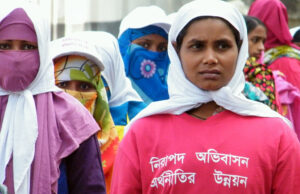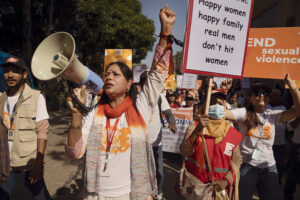Bangladesh in Crisis: Hindus’ Predicament Amidst Political Unrest
Bangladesh’s political environment has drastically changed, upending the lives of its citizens—particularly the Hindu minority—in the process. Along with causing political unrest, Prime Minister Sheikh Hasina’s removal has sparked a wave of violence and terror among religious minorities in the nation. Hundreds of Hindus from Bangladesh have found themselves desperately trying to find safety in neighboring India as the situation develops, but their efforts have been mainly unsuccessful.
The Situation as It Is Right Now
Bangladesh has descended into anarchy following Sheikh Hasina’s resignation and subsequent departure to India. The protests against her government, which started out as mass demonstrations, have now turned into targeted assaults on the Hindu community, which accounts for about 8% of the nation’s population. According to the Bangladesh Hindu Buddhist Christian Unity Council, vandalism has occurred in 45 of the 64 districts of the country targeting Hindu residences, places of worship, and businesses. Numerous people have been hurt and one school teacher has died as a result of this violent outburst.
The overthrow of Hasina’s secular-leaning government has ushered in a nightmare for a large number of Hindus in Bangladesh. The Hindu community has always backed Hasina’s party, the Awami League, because of its secular posture, in contrast to the hardline Islamist forces within the opposition bloc. The Hindu community is becoming more and more vulnerable as Islamist movements gain ground and the Awami League loses power.
Intense Attempts to Escape
Many Hindus who reside close to the Indian border have made attempts to escape to safety as a result of the increasing violence. Nevertheless, authorities in India and Bangladesh have resisted their attempts. For example, about 700–800 Hindus attempted to enter India in the Thakurgaon district but were compelled to turn back after receiving support from the local government. Both countries’ border guard personnel have stepped up their patrols, making it almost impossible for these refugees to flee the carnage.
Even with assurances of safety, dread is nevertheless widespread. The community continues to face dangers, as seen by reports of extortion and threats against Hindu business owners. One such instance is the forced payment of security money to a jeweler in Narsingdi. These events highlight how fragile the predicament of Hindus in Bangladesh is, torn between rising levels of violence and an unclear future.
Governmental and International Reaction
The world community has taken notice of the problem. Nobel Peace Prize winner Muhammad Yunus has voiced worries that the attacks on minorities could be part of a larger plot. Yunus is back in Bangladesh to head an interim administration. He did not, however, go so far as to identify the perpetrators, raising concerns about the extent and actual character of the assault.
In addition to advocating for harmony and the public’s help in stopping such assaults, Yunus has pledged to defend every citizen. However, the ground situation is still unstable, and it is not obvious how much control the interim government will have over the extremist groups that have gained strength from the recent political turmoil.
India, a nation with close cultural and historical links to Bangladesh, has expressed its worries as well. The Indian government has demanded that law and order be quickly restored and denounced the attacks on minorities. Tensions along the border and among the Indian people have increased as a result of the violence against Bangladeshi Hindus, which has struck a deep chord with India’s sizable Hindu population.
An Appeal for Cohesion and Defense
Leaders of the Hindu community in Bangladesh are urging cooperation and protection across religious boundaries as the crisis worsens. The people of Bangladesh have been exhorted by Moyna Talukdar of the Bangladesh Hindu Law Reform Council to put aside their differences and show solidarity against acts of violence. This call to action serves as a reminder that the resilience of the Bangladeshi people is rooted in their capacity to unite in times of disaster, even in the face of political unrest and conflict.
What motivates the targeting of Hindus?
There are three interconnected reasons why Hindus in Bangladesh have been targeted during this period of unrest:
Radical Elements and Revolutionary Spillover:
A variety of people with different goals are frequently involved in revolutions. Although the movement’s initial goal may have been to oppose government policies, radical elements—such as Islamists from organizations like Jamaat-e-Islami and Hefazat-e-Islam—have attempted to take advantage of the disturbance in order to achieve their own objectives. Attacking Hindus is a way for these groups to reaffirm their ideological stances and assert their power in the current political environment.
Historical Background and Intercommunal Tensions:
In Bangladesh’s past, communal tensions have frequently been made worse by periods of political unrest. Hindus have long been a disadvantaged religious minority, subject to assault during those times. Violence against Hindu communities and religious institutions has resulted from the current situation’s resuscitation of long-standing anxieties and biases.
Misinformation and propaganda:
Given the current predicament, the importance of misinformation cannot be overstated. Media outlets in neighboring India, especially those who espouse Hindutva ideology, have been quick to publicize reports of attacks on Hindus in Bangladesh. This has exacerbated the situation by stoking anxieties among Hindus in Bangladesh and India. Radical elements find it easier to defend their activities in this atmosphere of dread and mistrust because of the propagation of rumors and misleading information.
In summary, a nation at a crossroads
Bangladesh is currently in a crucial situation. The violence that followed Sheikh Hasina’s removal and targeted Hindus serves as a sobering reminder of the risks that religious minorities confront when there is political unrest. The world community and India, a neighbor, are keeping a careful eye on the interim government’s efforts to reestablish order in the hopes that peace and stability will be swiftly restored.
For Bangladesh’s Hindu population, nevertheless, the future is still unknown. The threats they continue to endure at home have not diminished, despite their mostly futile attempts to escape. The international community is now assisting the Bangladeshi government in making sure that all of its citizens’ rights and safety are upheld and that the violence that has afflicted the nation over the past few weeks is terminated.
Though there will be challenges along the way, Bangladesh may come out of this crisis as a stronger and more cohesive country if its leaders demonstrate a strong commitment to justice and equality.
